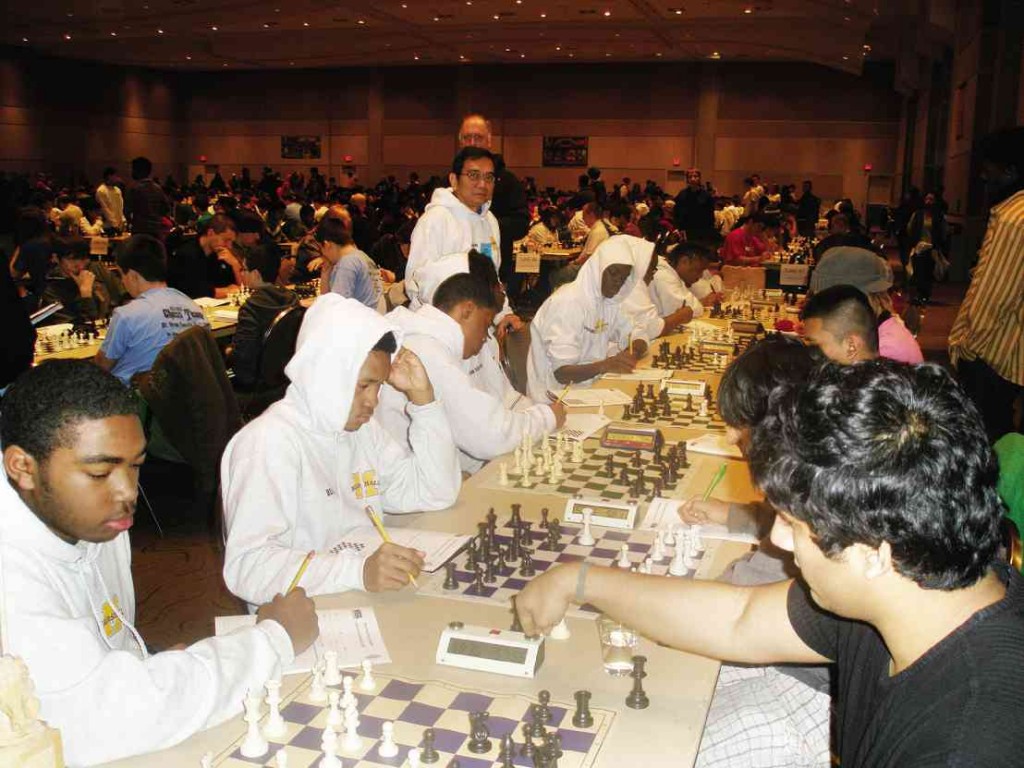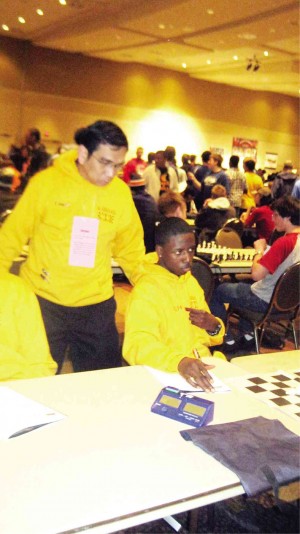A whistle-blower’s new crusade

HONEST WORK AND CRITICAL THINKING Mathematics teacher Joseph Ocol, who made a name for himself in the Philippines as an anticorruption crusader, now helps African-American students in west Chicago beat drugs and crime through a unique chess program. Already, some of his young players have won state- and US-wide medals. CONTRIBUTED PHOTO
He was a marked man when he migrated to the United States 15 years ago. Joseph Ocol, once a top planning executive of the Clark Development Corp. (CDC), had been placed on the government’s Witness Protection Program for blowing the whistle on what appeared to be a multibillion-peso election fund-raising scam in the agency tasked to transform a former US military air base into an industrial complex and economic zone.
For those who still remember, Ocol had recounted in Senate public hearings how representatives of the Bases Conversion and Development Authority and CDC delivered millions of pesos stashed in envelopes to the campaign manager of the then ruling Lakas-NUCD party ostensibly to fund the presidential campaign of Jose de Venecia in the 1998 elections. He claimed that those funds had come from contractors, who were forcibly milked by government officials, resulting in substandard infrastructure and cost escalations for what was then a big Centennial Exposition project.
But after the hoopla of congressional hearings, it seemed the case—like many corruption and bribery cases in the Philippines—did not prosper and was soon forgotten. That left Ocol out of work. The witness program’s P4,000 monthly allowance could not sustain his family’s needs.
It was therefore under the most compelling and distressing circumstances that he slipped out of the country in 1999. He hoped to start a new life.
Ocol, a Cebuano, has a double degree in Electrical Engineering and Education from the Abellana National School in Cebu City and an MBA from the Ateneo de Manila University. Before joining CDC, he was the manager of the maintenance division of Philippine Airlines. But like many new immigrants, he had a hard time starting over.
He settled for a job as a mathematics teacher in an inner city high school in Chicago’s west side, an area notorious for drugs, crime and violence.
Still a crusader
But Ocol’s crusading spirit— his passion to make a difference —apparently never left him. It was refired in 2005 when one of his students, a 17-year-old junior at the all-black Marshall Metropolitan High School, was shot dead by suspected gang members as he left the school building for home.
Disturbed by the rising incidence of gang wars in the Chicago west side, school authorities discussed with teachers and parents ways to lessen the spate of violence involving students. A suggestion led to the creation of a chess club, which Ocol, a chess enthusiast, volunteered to coach.
“The original idea was to keep the kids safe in school when it’s most dangerous,” Ocol retold recently during a visit home. He had noticed that gang-related violence usually erupts between 3 and 6 in the afternoon. “We wanted to hold them in school for a while and chess was one alternative.”
The chess club started with just a handful of interested students. Ocol sometimes dipped into his pocket to buy pizza and snacks to woo more members. In 2006, Ocol decided to expand his chess program to include not only high school students, but grade school and kindergarten pupils as well. He invited kids from nearby Faraday Elementary School. From eight students in 2005, the chess club membership from the two schools grew to more than 100 in 2010.
Ocol included in the chess program a unique mentoring scheme, where students became mentors of other students; high school kids helped elementary school kids, or in some cases, elementary pupils, who were quite advanced in their knowledge of chess, mentored high school students.
“This mentoring program cultivates self-esteem, self-confidence and self-reflection among kids. They become masters of their skills when they start teaching those skills to fellow students,” Ocol said.
Aiming high
The chess club has exceeded all expectations. After only four years, Ocol’s students have become champions in statewide and even national competitions.
On April 13, 2014, two students of the Faraday Elementary School chess team won the national championship trophy in the 11th All-Girls National Tournament sponsored by the Kasparov Foundation and the Renaissance Knights Foundation in Northbrook, Illinois. Lamari Childs and Tiara Fearon, both eighth graders, won the trophy in the under-16-year-old section.
A week earlier, Bobby Blankenship, an 11th grader at Marshall High, won the national championship trophy in the National K-12 Scholastic Chess Championship in San Diego, California. The US Chess Federation, the highest official governing body on chess in the United States, sponsors this tournament, which usually draws thousands of participants from schools in different parts of the United States.
Two months earlier, Blankenship also won the Illinois state championship trophy in the High School Chess Championship in Peoria, Illinois. Another Marshall High team member was Michael Hobbs, who placed 11th.
It was the first time students from Marshall High, many of them poor and disadvantaged, ever won top accolades.
Because it did not have sufficient funds, Marshall High had the least number of members in its chess team that competed in San Diego last April 3-6. It had only two members as against the nine or 11 members from other schools. Despite playing handicapped, the Marshall High team won all but one of its games, Ocol said proudly.
“African-Americans, who have some issues, largely domestic, have proven that they can beat anybody on the chess board,” Ocol said.
Teachers have also acknowledged the marked improvement in the scholastic performance of the student chess players. They have higher grades and perform better in their respective classes. They have better attendance too.
Due recognition
Ocol’s hard work and achievements as coach and mentor of the chess teams have not gone unnoticed. On April 30, the city council of Chicago passed a resolution commending Ocol, now 53, for his accomplishments. Likewise, Chicago Mayor Rahm Emanuel wrote him a letter of appreciation for his work.
On May 15, the Cook County Board of Commissioners also passed and approved a resolution commending Ocol for the success of his chess program.
Last year, Ocol was a finalist of the Kathy Osterman Award usually given to people for their exceptional work and outstanding contributions to public service. The award cited him for creating a unique after-class mentoring program for high school and elementary students in a violence-prone area in Chicago, and teaching mathematics to develop their critical thinking and keep them away from gangs.
US President Barack Obama, in a letter to Ocol dated May 23, 2013, expressed appreciation for his dedication as a teacher, which “has made a difference in the lives of countless young Americans.”
Last May, Obama congratulated Marshall High chess team for their victories. “Your extraordinary, proud coach, Joseph Ocol, shared your story with me, and I want to send my congratulations on this year’s hard-earned accomplishments,” wrote Obama to the school’s chess players.
Hometown commitments
Although he is now well settled in the United States, Ocol has not severed his ties with the country. He returns yearly to renew friendships. He also continues to support the scholarship program for poor students of the Virac-based Catanduanes Institute of Technology Foundation Inc. (CITFI), a nonprofit school which his parents founded in 1994 as the pioneer electronics and computer engineering school in the Bicol Region. It has provided 8,000 scholarships to poor students over the past 20 years, Ocol reported.
Since his parents passed away over four years ago, the job of supporting CITFI’s scholarship program passed to him. He heads a foundation named after his parents (Gaudy and Joy Foundation) to raise scholarship funds. He said he is willing to donate the school to parties who will continue the legacy of his parents of providing free education to poor students.
Ocol firmly believes that education helps combat crimes, violence and injustice—whether in the Philippines or the United States.
“Giving people the opportunity to improve their lives, through education, can instill the values of responsibility and honest toil, and bring peace to their lives,” he said.
Recently, the Cebu City council passed a resolution commending Ocol for “bringing pride to the Cebuano community.”
